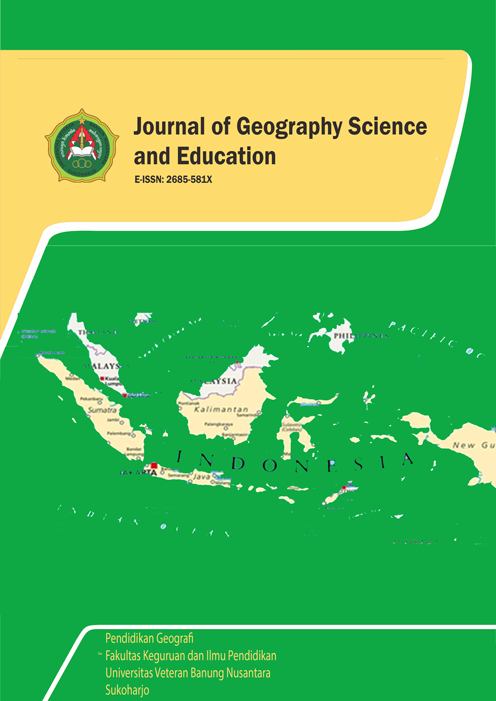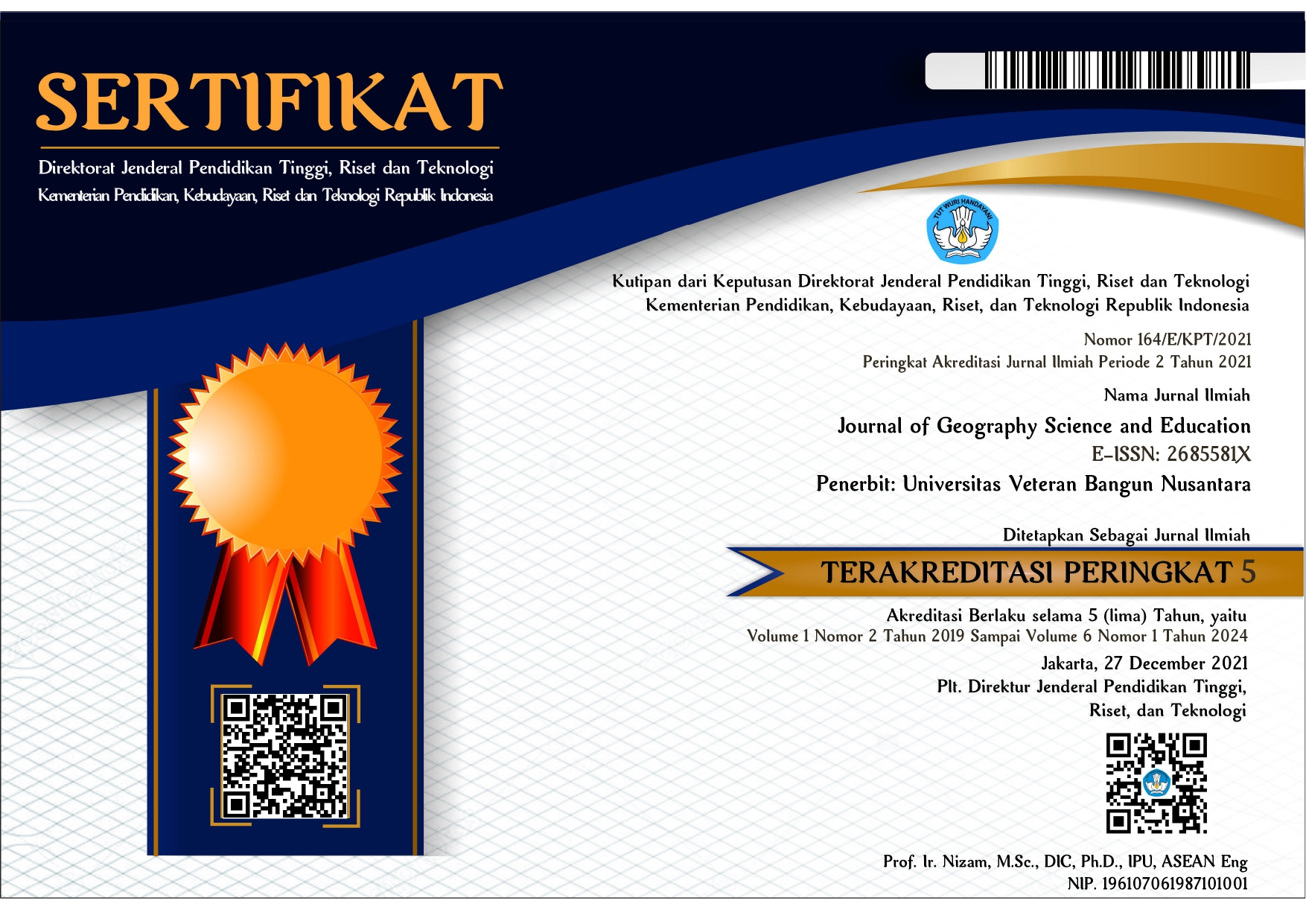The Effect Of Social Capital On Interest In Entrepreneurship With Self-Efficiency
DOI:
https://doi.org/10.32585/jgse.v4i2.2542Kata Kunci:
social capital, self-efficacyAbstrak
The formulation of the problem in this study is how the influence of social capital on the interest in entrepreneurship with self-efficacy in STPKat students. This study aims to analyze the effect of student social capital on entrepreneurial interest with self-efficacy. In order to answer this problem, Bourdie's theory of social capital and Bandura's theory of self-affication are used. This research method is quantitative, with a focus on analyzing the influence of student social capital on the interest in entrepreneurship with self-efficacy. The analysis used in this research is simple linear regression analysis, looking for the effect of social capital variable (X) on entrepreneurial interest and self-efficacy (Y). The results obtained are social capital has a positive influence coefficient, 0.355 the higher the social capital of a student, the higher the self-efficacy, or an increase of 35.5%. Social capital has a significance t of 0.540, which means this significance is > 0.05, so social capital has no significant effect on entrepreneurial interest and self-efficacy in STPKat Semarang students. Test the coefficient of determination on the adjusted R Square value. the contribution of social capital (independent variable) 8.8% to self-efficacy, in the sense that 81.2% can be found in further research outside the social capital variable.
Unduhan
Referensi
Alifia Fitriana Suprapto, Nur Lailatul Maghfiroh, D. (2016). Bagaimana Mahasiswa berbicara Politik? Media NUsa Creative.
Alwisol. (2005). Psikologi Kepribadian. Malang. UMM Press.
Chemers, M. M., Hu, L. T., & Garcia, B. F. (2001). Academic self-efficacy and first year college student performance and adjustment. Journal of Educational Psychology, 93(1), 55. https://doi.org/https://doi.org/10.1037/0022-0663.93.1.55
Fitriana, S., Ihsan, H., & Annas, S. (2015). Pengaruh efikasi diri, aktivitas, kemandirian belajar dan kemampuan berpikir logis terhadap hasil belajar matematika pada siswa kelas VIII SMP. Journal of Educational Science and Technology (EST), 1(2), 86–101.
Handriani, E. (2011). Pengembangan Kualitas Pendidikan Kewirausahaan diPerguruan Tinggi. Jurnal Ilmiah Inkoma, Volume 22, 83–95.
Muizu, W. O. Z., Evita, S. N., & Suherman, D. (2016). Disiplin kerja dan pengaruhnya terhadap kinerja pegawai negeri sipil., , . PEKBIS (Jurnal Pendidikan Ekonomi Dan Bisnis, 8(3), 172–182.
Murtini, W. (2008). Success Story Sebagai Pendekatan Pembelajaran Kewirausahaan. Varia Pendidikan, 20, No.2, 173–183.
Prof. Dr. Thomas Santoso, M. S. (2020). Memahami Modal Sosial. CV Saga Jawadwipa PUSTAKA SAGA.
Statistik, BPS, B. P. (2021). Tingkat Pengangguran Terbuka Berdasarkan Tingkat Pendidikan 2019-2021. https://www.bps.go.id/indicator/6/1179/1/tingkat-pengangguran-terbuka-berdasarkan-tingkat-pendidikan.html
Sugiyono, P. D. (2013). Metode Penelitian Kuantitatif, Kualitatif dan R&D. Alfabeta.
Thobias, E. (2013). Pengaruh modal sosial terhadap perilaku kewirausahaan (suatu studi pada pelaku usaha mikro kecil menengah di Kecamatan Kabaruan Kabupaten Kepulauan Talaud). Acta Diurna Komunikasi, 2(2).
Unduhan
Diterbitkan
Cara Mengutip
Terbitan
Bagian
Lisensi
License and Copyright Agreement
In submitting the manuscript to the journal, the authors certify that:
- They are authorized by their co-authors to enter into these arrangements.
- The work described has not been formally published before, except in the form of an abstract or as part of a published lecture, review, thesis, or overlay journal. Please also carefully read JGSE's Posting Your Article Policy at http://pubs2.ascee.org/index.php/ijele/about/editorialPolicies#custom-5
- That it is not under consideration for publication elsewhere,
- That its publication has been approved by all the author(s) and by the responsible authorities – tacitly or explicitly – of the institutes where the work has been carried out.
- They secure the right to reproduce any material that has already been published or copyrighted elsewhere.
- They agree to the following license and copyright agreement.
Copyright
Authors who publish with Journal of Geography Science and Education agree to the following terms:
- Authors retain copyright and grant the journal right of first publication with the work simultaneously licensed under a Creative Commons Attribution License (CC BY-SA 4.0) that allows others to share the work with an acknowledgment of the work's authorship and initial publication in this journal.
- Authors are able to enter into separate, additional contractual arrangements for the non-exclusive distribution of the journal's published version of the work (e.g., post it to an institutional repository or publish it in a book), with an acknowledgment of its initial publication in this journal.
- Authors are permitted and encouraged to post their work online (e.g., in institutional repositories or on their website) prior to and during the submission process, as it can lead to productive exchanges, as well as earlier and greater citation of published work.
Licensing for Data Publication
Journal of Geography Science and Education use a variety of waivers and licenses, that are specifically designed for and appropriate for the treatment of data:
- Open Data Commons Attribution License, http://www.opendatacommons.org/licenses/by/1.0/ (default)
- Creative Commons CC-Zero Waiver, http://creativecommons.org/publicdomain/zero/1.0/
- Open Data Commons Public Domain Dedication and Licence, http://www.opendatacommons.org/licenses/pddl/1-0/
Other data publishing licenses may be allowed as exceptions (subject to approval by the editor on a case-by-case basis) and should be justified with a written statement from the author, which will be published with the article.
Open Data and Software Publishing and Sharing
The journal strives to maximize the replicability of the research published in it. Authors are thus required to share all data, code or protocols underlying the research reported in their articles. Exceptions are permitted but have to be justified in a written public statement accompanying the article.
The associated persistent identifiers (e.g. DOI, or others) of the dataset(s) must be included in the data or software resources section of the article. Reference(s) to datasets and software should also be included in the reference list of the article with DOIs (where available). Where no domain-specific data repository exists, authors should deposit their datasets in a general repository such as ZENODO, Dryad, Dataverse, or others.
Small data may also be published as data files or packages supplementary to a research article, however, the authors should prefer in all cases a deposition in data repositories.










